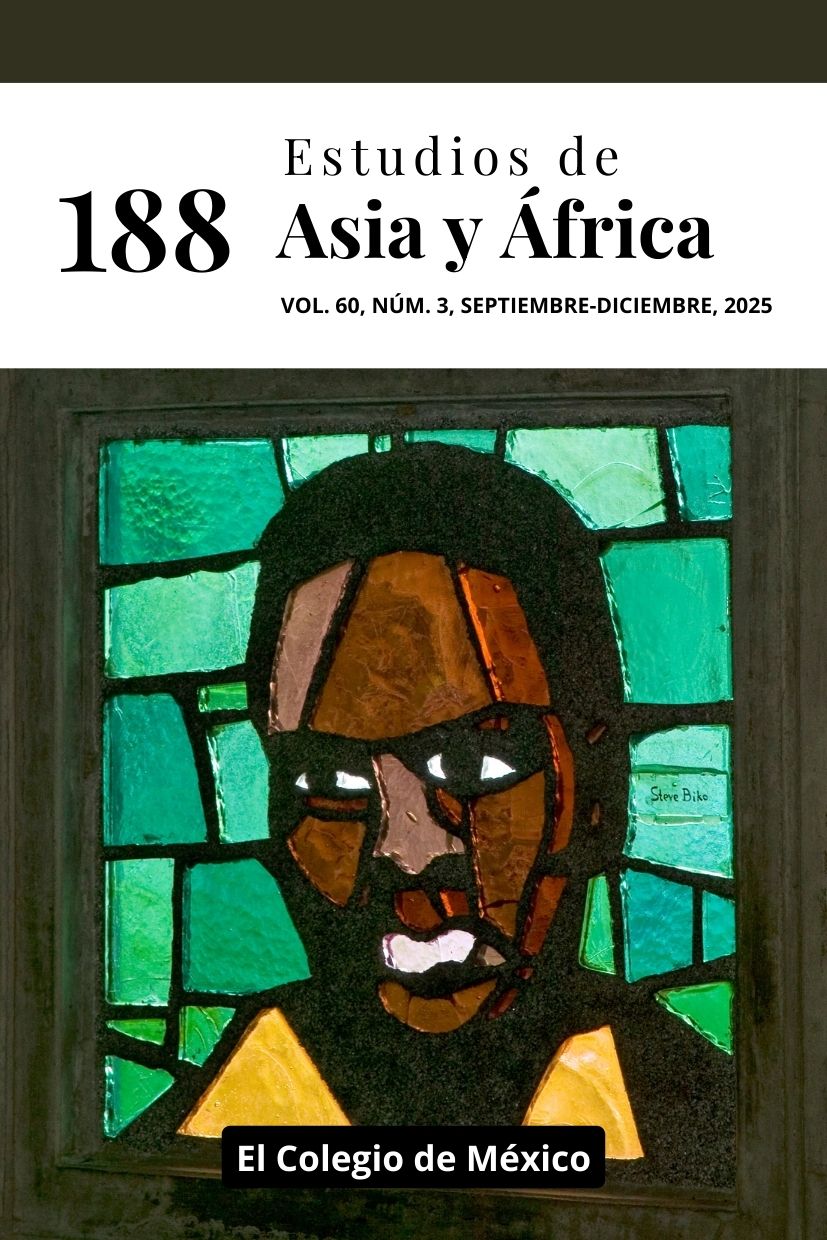Abstract
This interpretation of the poem “Ka-Ḥādiṯatin Ġāmiḍatin” (Like a Mysterious Event) by Mahmud Darwish is based on a personal translation (from Arabic to Spanish) of the poem, and on the philosophical studies on language and poetry by Martin Heidegger, as well as the concept of the engaged writer by Jean-Paul Sartre. The poem explores the meaning and creation of poetry. Its verses collect the hopeful words that the Greek poet Yanis Ritsos addressed to Palestine more than thirty years ago. These remarks have gained new relevance in light of the current conditions in that region.
References
Anastasi, Paul. 1990. “Yannis Ritsos, a Greek Poet, 81; Wrote Verse Inspired by Politics”. The New York Times. 14 de noviembre de 1990. https://www.nytimes.com/1990/11/14/obituaries/yannis-ritsos-a-greek-poet-81-wrote-verse-inspiredby-politics.html
Antaki, Ikram. 1980. Encuentro con Yasser Arafat. México: acere.
Chambers, Marjorie. 1992. “Yánnis Rítsos and Greek Mythology”. Hermathena 153: 37-56. http://www.jstor.org/stable/23041302
Darwish, Mahmud. 1995. Memory for Forgetfulness: August, Beirut, 1982. Traducido por Ibrahim Muhawi. Berkeley: University of California Press. http://ark.cdlib.org/ark:/13030/ft1z09n7g7/
Darwish, Mahmud. 1997. [Recitación del poema] “Ka-Ḥādiṯatin Ġāmiḍatin”. Youtube 8:05. https://youtu.be/uUc2XnCZ50s?si=3GiOqkySn-5PGa5I
Darwish, Mahmud. 2003. Mural. Traducción de Rosa Isabel Martínez Lillo. Madrid: Ediciones del Oriente y del Mediterráneo.
Darwish, Mahmud. 2004. Lā ta’taḏir ’ammā fa’alta [No te disculpes por lo que hiciste]. Beirut: Riad Al-Rayyes.
Darwish, Mahmud. 2005a. Ka-Zahr al-lawz ’aw ’Ab‘ad [Como la flor del almendro o más allá]. Beirut: Riad Al-Rayyes.
Darwish, Mahmud. 2005b. “Counterpoint” [Antítesis, a Edward Said]. Le Monde diplomatique. Traducción del francés al inglés por Julie Stoker. https://mondediplo.com/2005/01/15said
Darwish, Mahmoud. 2007. The Butterfly’s Burden. Traducido por Fady Joudah. Port Townsend: Copper Canyon Press.
Darwish, Mahmud. (1973) 2013. Muḥāwalah Raqm 7 [Intento número 7]. Ramallah: El Nasher.
Eliot, Thomas Stearns. (1943) 2011. Cuatro cuartetos. 2.a ed. Ciudad de México: Fontamara.
Eurípides. 1995. Tragedias. Edición bilingüe. Barcelona: Gredos.
Gayosso Martínez, Felipe. 2019. “‘El jugador de dados’, un poema de Maḥmūd Darwīš”. Estudios de Asia y África 55 (1): 167-190. https://doi.org/10.24201/eaa.v55i1.2584
Heidegger, Martin. 2000. Elucidations on Hölderlin’s Poetry. Traducido por Keith Hoeller. Nueva York: Humanity Books.
Heidegger, Martin. 2001. Poetry, Language, Thought. Traducido por Albert Hofstadter. Nueva York: Harper Perennial.
Heidegger, Martin. 2014. “Hölderlin and the Essence of Poetry”. En The Paul de Man Notebooks, editado por Martin McQuillan, 171-182. Edinburgo: Edinburgh University Press. https://doi.org/10.3366/edinburgh/9780748641048.003.0016
Kanafani, Ghassan. 2009. “Palestinian Literature”. En Poetry of Resistance in Occupied Palestine, 3-8. Traducido al inglés por Sulafa Hijjawi. Bagdad: Ministry of Culture.
Kanafānī, Gassān, Montserrat Rabadán Carrascosa e Ignacio Gutiérrez de Terán. 1998. “En mi entierro (Cuento del escritor palestino Gassān Kanafānī)”. Estudios de Asia y África 33 (3): 599-610. https://doi.org/10.24201/eaa.v33i3.1470
Kant, Immanuel. 2004. Observaciones sobre el sentimiento de lo bello y lo sublime. Edición bilingüe alemán-español. Traducido por Dulce María Granja Castro. México: Fondo de Cultura Económica.
Lane Fox, Robin. 2008. The Classical World: An Epic History of Greece and Rome. Maryborough: Penguin Books.
Lledó Íñigo, Emilio. 2015. El concepto “poíesis” en la filosofía griega. Heráclito-sofistas-Platón. México: Academia Mexicana de la Lengua.
Los Angeles Times. 1990. “Yannis Ritsos, 81; Prolific Greek Poet”. 13 de noviembre de 1990. https://www.latimes.com/archives/la-xpm-1990-11-13-mn-4544-story.html
Mahmoud Darwish Foundation. 2008. “Mahmoud Darwish’s Biography”. http://mahmouddarwish.ps/en/article/80000160/Mahmoud-Darwish---Biography
Museum of Cycladic Art. 2009. “Yannis Ritsos: Tribute to the Poet of Romiosini”. https://cycladic.gr/en/page/giannis-ritsos
Nietzsche, Friedrich. 2005. Así hablaba Zaratustra. 29.ª ed. Traducido por Carlos Vergara. México: Edaf.
Ovidio Nasón, Publio. 2002. Metamorfosis. Traducido por Ana Pérez Vega. Alicante: Biblioteca Virtual Miguel de Cervantes. http://www.cervantesvirtual.com/nd/ark:/59851/bmccz361
Platón. 1871. “El Banquete o Del amor”. En Obras completas de Platón, traducido por Patricio de Azcárate, t. 5, 297-366, Madrid: Medina y Navarro. https://www.filosofia.org/cla/pla/azf05285.htm
Ritsos, Yanis. 1974. Yannis Ritsos: Selected Poems. Traducido por Nikos Stangos. Baltimore: Penguin Books.
Sartre, Jean-Paul. 1950. What is Literature? Traducido por Bernard Frechtman. Londres: Methuen.
Yeshurun, Helit. 2012. “‘Exile Is so Strong within Me, I May Bring It to the Land’: A Landmark 1996 Interview with Mahmoud Darwish”. Journal of Palestine Studies 42 (1): 46-70. https://doi.org/10.1525/jps.2012.xlii.1.46
This work is licensed under a Creative Commons Attribution-NonCommercial-NoDerivatives 4.0 International License
Copyright 2022 Estudios de Asia y África



